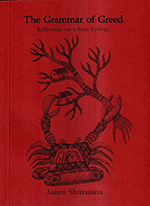Aseem Shrivastava’s The Grammar of Greed is a rare intervention—not just in the intellectual history of ecological thought, but in the cultural and existential topography of our time. What Shrivastava delivers is not another policy critique or climate call-to-action. Instead, he plunges into the deep structures of consciousness and culture that sustain what he calls a ‘fatal ecology’—a system where the grammar of greed becomes the universal syntax of life, organizing both infrastructures and imaginations.
There is an intimacy in the tone of this book; an almost meditative cadence that calls the reader not just to think differently, but to feel differently. To feel the losses we have normalized, the silences we have accepted, and the violence we now delegate to machines, algorithms, and invisible systems. In a world increasingly geared toward distraction, Shrivastava demands attention—slow, deliberate, and ethical.

